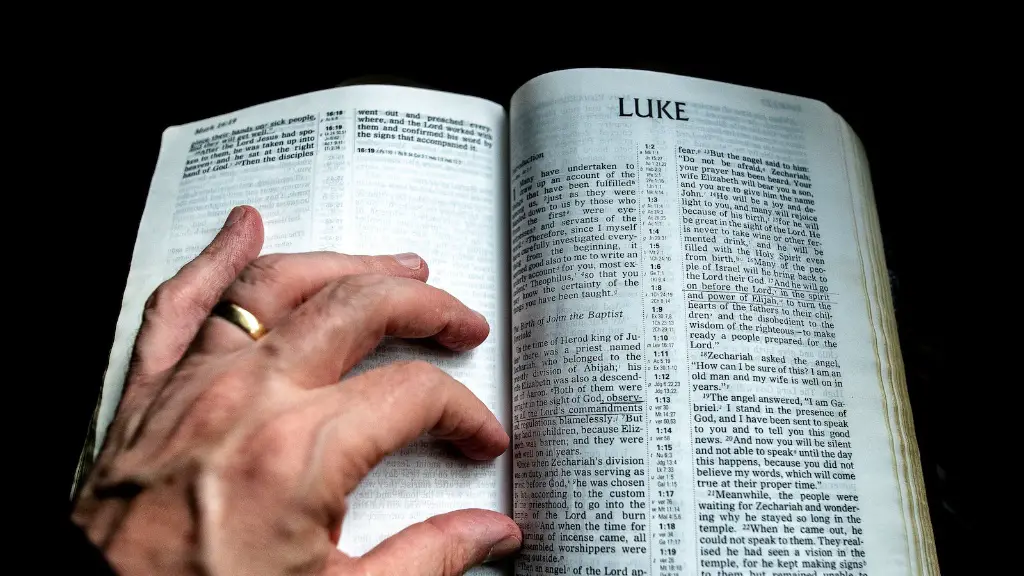The debate around abortion is an emotional and highly moral one, and has been highly polarizing for millennia. While there are some religious texts which discuss abortion, the Bible offers no clear answer to the question of whether abortion is morally right or wrong. However, scriptural analysis of passages in the Bible may provide some insight into the beliefs of biblical writers on the matter of abortion.
The Bible does not explicitly mention abortion, and thus it is hard to draw clear conclusions as to what the authors of the Bible believed about it. But certain passages, such as Exodus 21 and Numbers 5, may offer some insight into the views of ancient authors regarding abortion. In Exodus 21, it is written that if a man causes a woman “to miscarry, then he must pay a fine according to what the woman’s husband demands and the court allows.” This implies that an abortion, intentional or accidental, was considered a punishable offense.
In Numbers 5, it is written that any pregnancy resulting from a “sinful” sexual relationship should be punished by a prescribed remedy that can potentially cause the fetus to be aborted. This may suggest that ancient authors of the Bible viewed the termination of a pregnancy as a punishment for the sin committed.
Though abortion is not explicitly mentioned in the Bible, there are some scriptures which indicate that ancient authors viewed termination of a pregnancy as a punishment. This is further reinforced by the fact that the Bible contains several passages which discuss abortion in terms of a life taken. This view is further complicated by other passages in the Bible which suggest that life begins at conception or in the womb, making abortion a controversial religious topic.
Despite the lack of a clear answer in the Bible as to whether abortion is permissible or not, some Christian denominations have taken a stance on abortion. The Catholic Church, for example, has declared abortion to be a sin, and many Christian denominations believe that abortion is wrong in most circumstances. Other Christian denominations, such as the United Methodist Church, allow for abortions in certain cases, such as in cases of danger to the life or health of the woman.
In the end, the Bible does not offer a clear answer to the question of whether abortion is permissible or not. Ultimately, it is up to each individual’s interpretation of scripture to decide what stance to take on the matter. However, it is clear that ancient authors of the Bible believed that abortion was a punishable offense.
Abortion and Pro-Life
In recent years, the pro-life movement has gained significant traction, with many anti-abortion activists believing that life begins at creation. This view is heavily supported by the Christian faith, with many within it believing that abortion is killing an innocent life. This is evidenced not only by passages in the Bible which discuss the matter of abortion, but also by the widespread support which the pro-life movement has received in recent years.
The pro-life movement is particularly strong in the United States, with many states passing laws which severely restrict access to abortion. This has led to a significant decline in the number of abortions being performed in the last decade, as many individuals no longer feel that they have the ability to access safe and secure abortions. Ultimately, the pro-life stance is widely supported in the Bible, and is a major factor in the decline in abortions which has been seen in recent years.
Though the Bible does not clearly answer the question of whether abortion is permissible or not, it does provide insight into the view of ancient authors on the matter, suggesting that they believed it to be a punishable offense. As such, many within the Christian faith believe that abortion is wrong, and have been advocating for laws which restrict access to abortion. Though the debate continues to rage on, the Bible provides insight into the matter which should not be overlooked.
Abortion and Pro-Choice
In contrast to the pro-life movement, the pro-choice movement believes that a woman should have the right to make her own decisions regarding her reproductive health. This movement has grown in recent years, as access to abortion has become increasingly restricted in certain parts of the world. Ultimately, the pro-choice movement believes that a woman should have the right to make decisions about her own body, and should not be forced to carry an unwanted pregnancy to term.
Though the Bible does not provide a clear answer as to whether or not abortion is permissible, some passages suggest that ancient authors viewed it as a punishable offense. However, in recent years the pro-choice movement has grown and has been supported by many individuals and organizations. As such, while the debate around abortion continues to rage on, it is clear that the issue of abortion has been heavily contested and is still highly polarized.
A further complication to the issue is the fact that the Bible does not provide a clear answer as to when life begins. While some passages suggest that life begins at conception or in the womb, others suggest that a fetus does not become a human life until after birth. This view is supported by many within the Christian religion, and it is difficult to draw any clear conclusion from the Bible as to when life begins.
Ultimately, the Bible does not provide a clear answer as to whether abortion is permissible or not. Different passages suggest different stances on the matter, and it is ultimately up to each individual to interpret scripture and come to his or her own position. However, as the debate continues to rage on, it is evident that the issue of abortion is still highly contested and remains highly controversial.
Abortion and Reproductive Rights
In recent years, the reproductive rights of women have been heavily contested, with governments and religious organizations taking different stances on the matter. Ultimately, however, it is clear that women should have the right to make decisions about their own reproductive health. This is especially important in cases where a woman’s health or life may be endangered by continuing a pregnancy.
Without the right to access safe and secure abortions, women are being put at risk. Without the ability to make decisions about their own bodies, women are being unduly subjected to the decisions of others. This is a violation of their human rights, and those of the unborn. As such, the issue of reproductive rights is of particular importance when discussing the morality of abortion.
Though the Bible does not provide a clear answer as to whether abortion is permissible or not, it is clear that ancient authors viewed it as a punishable offense. However, as the reproductive rights of women have come to the forefront of public discourse, it is becoming increasingly clear that women should have the right to make decisions regarding their own health. As such, while the debate over abortion continues, it is important to consider the rights of women when discussing the matter.
Ultimately, the Bible does not provide a clear answer as to whether or not abortion is permissible. But what it does offer is insight into the beliefs of ancient authors regarding the matter, suggesting that they viewed it as a punishable offense. As such, while the debate over abortion continues, it is important to consider the rights of women, as well as the views of ancient authors, when discussing the matter.
Abortion and Medical Ethics
The debate around abortion is a highly contentious one, and is one which raises several ethical questions. Questions of morality, the rights of the unborn, and the rights of the mother are all of paramount importance when considering the issue of abortion. This is further complicated by the fact that in many countries, the legal status of abortion is the subject of much debate and contention.
When discussing the morality of abortion, it is important to consider medical ethics. Medical ethics is a branch of bioethics which focuses on the morality of medical practice and decision-making. It is a way of thinking which aims to minimize suffering, maximize well-being, and treat those in our care with respect, autonomy, and compassion. This is an important consideration when discussing the morality of abortion.
The Bible does not provide a clear answer as to whether or not abortion is permissible. However, when considering the matter it is important to take into account medical ethics. It is important to think about the rights of both the mother and the unborn when discussing the morality of abortion, and to consider the broader implications of any decision being made.
Ultimately, the Bible does not provide a clear answer as to whether or not abortion is morally permissible. But it does provide insight into the views of ancient authors regarding the matter, suggesting that they viewed it as a punishable offense. As such, it is important to consider the ethical implications of any decision being made when discussing the morality of abortion.





